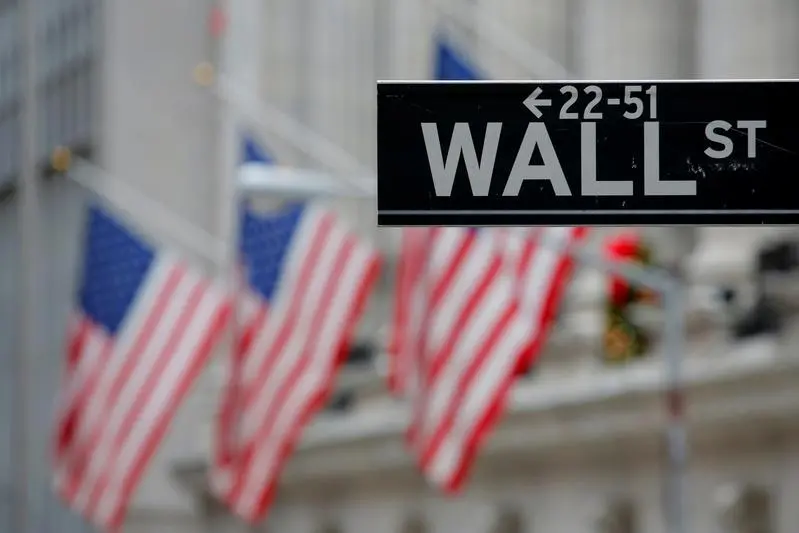PHOTO
- Dow Jones, S&P set new records
- Oil price flat despite supply disruption fears
- Mideast stocks end week on positive note
- Pound continues to slide
Global markets
All three major stock market indices in the United States hit record heights at the end of last week, with the S&P 500 index breaking through the 3,000 barrier for the first time as investors continued to place money in riskier assets in the belief that the U.S. Federal Reserve is likely to cut interest rates following a two-day testimony to Congress by its chairman, Jerome Powell.
The S&P500 index closed at a record high of 3,013.77 on Friday, up 0.46% on the day and 20.22% for the year so far. The Dow Jones Industrial Average also hit new highs, closing 0.9% higher for the day at 27,332.03. It has gained 17.17% in the year to date. Meanwhile, the Nasdaq Composite index closed at 8,244.69 - up 0.59% on the day and 24.25% for the year so far.
In a note published on Friday, London Capital Group said that Powell's comments to Congress indicates that he feels that "the global economic slowdown outweighs the good data in the U.S." and that the relationship between positive jobs data and inflation has weakened, given that inflation has barely ticked up despite the U.S. unemployment rate standing at a 50-year low.
European stocks finished the week flat, however, with the STOXX 600 index weighed down by a sell-off in European pharmaceutical shares as the U.S. government scrapped a healthcare rebate plan and investors feared further intervention to limit drugs pricing.
Oil markets
Oil prices finished the week flat as Tropical Storm Barry swirled over the Gulf of Mexico, leading to 70% of the supplies emanating from the area - or 1.3 million barrels per day - being cut, according to a Reuters story citing the U.S. Bureau of Safety and Environmental Enforcement.
Brent crude futures closed unchanged on Friday at $66.72 per barrel, while West Texas Intermediate (WTI) crude futures closed 0.32% higher at $60.21 per barrel.
The International Energy Agency indicated on Friday that supply will continue to outpace sluggish global demand leading to a growing stockpile over the next nine months. In a note published on Friday, Han Tan, an analyst at forex broker FXTM said: "The surge in U.S. shale production has been blunting OPEC+ producers’ attempts to rebalance global markets, while the demand for oil continues to waver in the face of heightened U.S.-China trade tensions. The prospects of an oversupply also raise serious questions about whether OPEC+ members can afford to exit its current production cuts campaign in March and risk another slump in oil prices."
However, a separate analysis published on Saturday by economists at Qatar National Bank stated that it believed the oil market would tighten over the next few quarters, citing sanctions against Venezuela and Iran and "infrastructure bottlenecks in the key shale oil production region of the Permian Basin in West Texas", although it expects the latter to ease early next year. It predicted an average Brent crude price of $68 per barrel for 2018, rising to $72 per barrel next year.
Middle East markets
Most Middle East markets closed higher on Thursday, with the Saudi stockmarket index closing 0.7% higher as traders anticipated positive results from the kingdom's listed banks ahead of earnings announcements. The index closed at 8,968.23 and is up 14.58% for the year-to-date.
Kuwait's premier index has continued its stellar performance so far this year, closing 0.14% higher on Friday at 6,776.83, up 28.66% since the start of the year. The Abu Dhabi index also closed the week on a high note - up 0.51% at 5,5052.43 as index heavyweights First Abu Dhabi Bank and Etisalat finished in positive territory, but the Dubai Financial Market closed the week flat, dragged down by a slight (0.42%) decline in Emaar Properties' shares. The Dubai market index is still 1% higher over the course of the month, though, and 6.16% higher than the start of 2019.
Currencies
The British pound ended the week on a slightly higher note against the euro despite ongoing uncertainty surrounding Brexit, ending a nine-week run of losses which has seen it decline in value to €1.156, down from 1.176 in early May.
According to Reuters, Japanese bank MUFG said in a note to clients that it expected the pound to continue weakening against the euro as Brexit talks reach a crunch period during the next few months.
“The pound sell-off remains relentless with no clear end in sight,” the note said.
The pound also finished last week slightly higher against the U.S. dollar as the greenback weakened on expectations of a Federal Reserve rate cut. The pound closed 0.4% higher against the dollar at $1.2573, according to Eikon data. The dollar index, which measures performance against a basket of six global currencies, closed 0.34% lower at 96.722.
Precious metals
The prospect of a weakening dollar also continued to push gold prices higher, with spot gold climbing 0.85% to $1,415.495 per oz on Friday. Gold futures climbed 0.41% to close at $1,410.10.
(Writing by Michael Fahy; Editing by Mily Chakrabarty)
Our Standards: The Thomson Reuters Trust Principles
Disclaimer: This article is provided for informational purposes only. The content does not provide tax, legal or investment advice or opinion regarding the suitability, value or profitability of any particular security, portfolio or investment strategy. Read our full disclaimer policy here.
© ZAWYA 2019




















